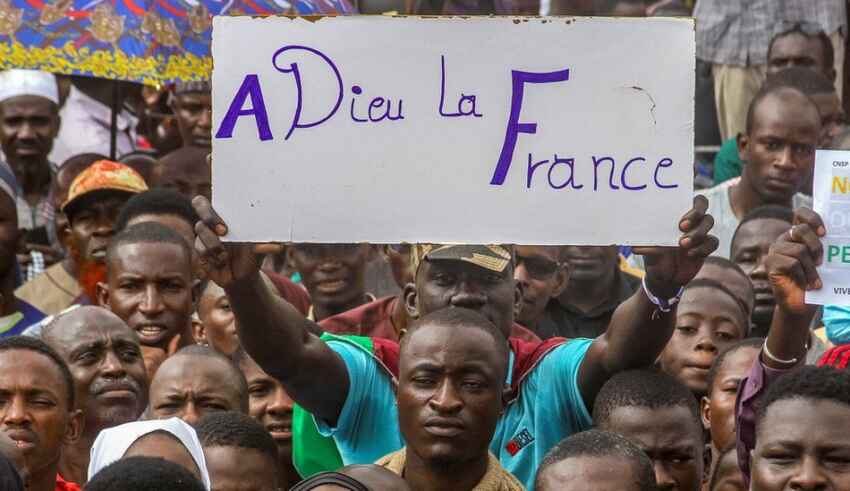
Many Western African countries are still dealing with the legacy of French colonialism, that shaped their political structure and defined years of conflict and instability in the region. Recently, Niger has become the most recent country whose military seized control of the government, following countries such as Mali, Chad and Guinea, who were also French colonies.
Before Niger, it’s neighbouring countries of Mali and Burkina Faso had strong anti-French speeches that fulled their resentment against the government, that ultimately led to the deposition of Pro-French government. The influence in Niger’s population was undeniable, and many protests ensued demanding the removal of President Mohamed Bazoum, who was seen as a puppet for French interests, and resulted in an attack on the French embassy, securing the coup.
Prior to the attack, many agreements between France and Niger have been revoked by the Junta, led by General Abdourahmane Tchiani. Many of these agreements allowed Niger’s military to be used on behalf of pro-french leaders, that would strengthen corrupt and abusive policies. This corrupt alliance between French leaders and African politicians secured an “elite” in the continent, over the detriment of African population.
The dissatisfaction from Niger’s civilians, and not only exclusive to Niger, but many other countries in Africa, was the same as the historical dissatisfaction when the country was a colony, and France would take control over their resources, leaving them dry and unable to develop on their own. After the coup, Niger became a reliable ally in the Sahel Region in Africa when fighting armed groups as anti-French sentiments are becoming increasingly prominent in the area.
The Sahel region in general is becoming increasingly active when it comes to stopping France’s advancement and influence over the last decades. Just now recently, Algerian state radio said that it rejected a French request to fly over its airspace to carry out a military operation in Niger. French officials denied this report.
This all brings us to question when did Niger effectively conquered its independence. It seems as if economic and political dependence from its former colonist never seized to exist, and a vicious cycle was established between the countries, where the roles of colony and coloniser were still pretty much visible.
On a personal note, a coup is traditionally seen as an illegitimate thing, as overthrowing a democratically elected government can pose severe consequences internally and internationally. However, as much as the action itself is never the correct way to get something done, civilian sentiment cannot be ignored.
As seen previously, corruption reigns in Africa, and in Niger is no different. Ties between those in power and other global potencies are clearly seen by the people, who show their discontent by protesting demanding a reform: a right guaranteed to them by democracy. So in my opinion, when a country is willing to sever ties with other States of the international community, ending year long relationships that would in some way benefit them, to make them feel as if the government is actually there to represent them, makes the legitimacy of a coup to be reevaluated, as it seems quite legitimate for me.
Russia also played a significant role in the Niger coup. The Wagner group is certainly taking advantage from the anti-French, essentially anti-west sentiment in the Sahel region, and is acting as a helping hand for Niger to fight these colonialists standards. Russian flags being waved in the protests are not the only scenario where the support for Russian intervention is visible. Among politicians, many have been know to have strong ties with Russia, including Abdouramane Oumarou, from Niger’s Incin Africa party; and MPD president Sulhu, who was actually arrested on charges of colluding with a foreign power to destabilise Niger, and such power, is Russia.
Russia’s presence in Niger’s neighbouring country of Mali, is not only supported by Mali civilians, but Niger’s as well. But we cannot mistake support for blindness, as many actions taken by the Wagner Group is excused by Mali and Niger population, such as the Moura atrocity, were 500 people were massacred by Russian soldiers.
The proliferation of Russian views, or manly, anti-west views as Russia’s expansionism takes place is serving as a fuel for many conflict in places that always found themselves in need of support from more developed countries, to finally break the historical tie that is seen as what stops them from developing. International diplomacy is still needed for a country development, but the feeling of dissatisfaction is taking over the years of mistreat and allowing countries to build themselves from the ground up. Losing support is increasing nationalism and self-sustainability.
Once again, and not as a surprise for the international community, African countries are still being exploited for their resources in exchange for basic needs by global potencies, enhancing historical animosity between them. The coup was foreseeable, as civilian discontent has been visible for decades. However, with the coup and the end of aid for Niger from foreign countries, the future of the State is yet to be determined.
When dealing with a coup d’Etat, we need to consider all the scenarios and actions taken that led to such action, as a change in an democratically elected government can instantly destabilise not only a country, but the entire region, and bring various consequences that many have not been considered. The short term is chaos, but on the long-term, we might be seeing a country rebuild itself with a strong nationalist feeling that can be their salvation, or their doom.
REFERENCES:
https://www.bbc.com/news/world-africa-66406137
https://www.reuters.com/article/niger-security-algeria-france-idAFKBN2ZX0MA
https://www.theguardian.com/global-development/2023/aug/08/explainer-whats-behind-the-niger-coup
By The European Institute for International Law and International Relations.















